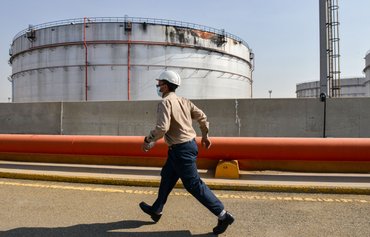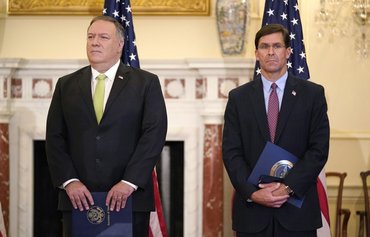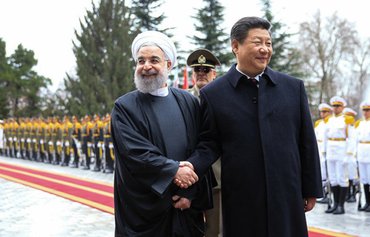The US "maximum pressure campaign" has had an enormous effect on Iran's oil sector in recent months, drastically decreasing its production and exports.
Although the Iranian government had estimated its oil production to be around 1 million barrels per day and oil revenues to be some $50 million in the current year, media outlets have quoted experts as saying the country's oil exports currently stand at around 100,000 barrels per day.
In 2018, the US government announced it would reinstate previous sanctions on Iran and impose new ones in order to put maximum pressure on the country.
It has stated that one of the main goals of the maximum pressure campaign was to reduce Iran's oil exports and oil revenue to zero.
The ultimate goal is to force Tehran to choose between its own economic viability and its destabilising activities around the region.
Fariborz Etemad, a Tehran-based economist, told Al-Mashareq the new sanctions against Iran have been effective in dropping oil exports from some 2.5 million barrels to an average of 150,000 per day.
Bartering oil for essential goods
Officials have said they hope to barter Iran's oil for essential goods.
Iranian Oil Minister Bijan Zanganeh, who was personally sanctioned by the US October 26th, has been calling for an exchange of oil for essential goods in an effort to circumvent sanctions.
As such, Zanganeh has asked that a commission be formed consisting of Iran's Industry, Mine and Trade minister, as well as economists and other cabinet officials, to discuss the logistics and details of bartering.
On the heels of Zanganeh's call, Iran Central Bank (CBI) Governor Abdolnaser Hemmati said bartering oil for the country's basic goods could be initiated and proceed under the direction of the oil ministry.
The focus on obtaining goods by way of oil bartering will further cripple Iran's private sector and increase the government's interference in the economy, both of which will fundamentally damage the structure of the economy in the short and long terms, Etemad, the economist, said.
The cost of expanding Iran's threatening nuclear and missile programmes is mostly covered by oil sales. The maximum pressure campaign aims to prevent the continuation and potential expansion of these programmes.
Prior to the new sanctions, Iran produced 4 million barrels of oil per day and exported 2.5 million of that number. These figures are significantly lower now.
Meanwhile, the sanctions have also caused a reduction in Iran's non-oil exports.
The domestic daily Taadol reported that the volume of Iran's foreign trade in the 150-day period ending on August 31st compared to the same period last year shows that the volume of trade of oil-free goods was approximately $24.6 billion, a decrease of 31% compared to the $35.6 billion in the same period last year.
'Maximum pressure helping Iraq, region'
The Iranian regime, through the Islamic Revolutionary Guard Corps (IRGC), has used much of its oil export income to implement its regional expansionist policies through proxies such as Kataib Hizbullah in Iraq, which Iraqi experts say is a threat to that country's stability.
Intifadh Qanbar, Future Iraqi Constitutional Party chairman, told Al-Mashareq "Kataib Hizbullah, whose elements take advantage of Iraqi resources to serve IRGC interests, are no less threatening to the security and future of Iraq than the 'Islamic State of Iraq and Syria' (ISIS)."
He said the IRGC-backed militia intimidates investors wishing to enter Iraq's markets, "because they think if they invest in Iraq, the latter may no longer rely on imports from Iran".
"The US's maximum pressure campaign on Iran is helping the region because if it were not in place, IRGC activities would be more invasive and hostile in Iraq, Syria, Lebanon and Yemen," he said.
Hassan al-Obeidi contributed to this feature.

![The US maximum pressure campaign has had an enormous effect on Iran's oil sector, drastically decreasing its production and exports. [Photo via Tasnim News]](/cnmi_am/images/2020/11/24/26821-Iran-oil-sanctions-600_384.jpg)






